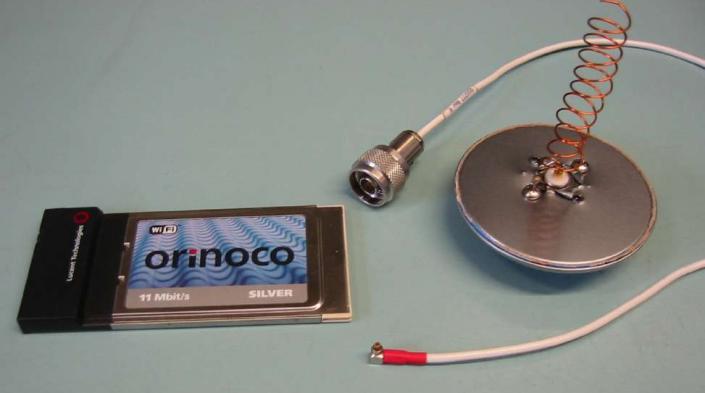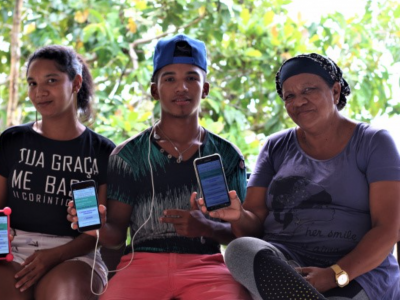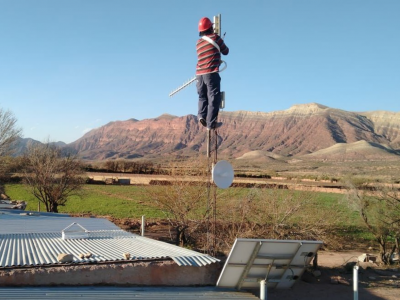
An early wireless card and home-made antenna made by Mike Jensen in the early 90s. Photo used with permission by APC.
This newsletter is part of the project titled, “Local Access Networks: Can the unconnected connect themselves?” developed by APC in partnership with Internet Society and Rhizomática, with support from Canada's International Development Research Centre (IDRC). It is republished here on Rising Voices as part of a partnership with APC. Click here to see the original post on APC's website.
1. APC is hiring
APC is looking for both individuals and organisations to join the new “Connecting the unconnected: Supporting community networks and other community-based connectivity initiatives” project. There are six positions available. The deadline to submit applications is 2 January 2019. Read an overview of the project here.
The job openings are as follows.
- Opportunities for individuals
- Opportunities for institutions
- Regional coordination: The project will be primarily implemented through a peer community composed of community networks from three regions: Africa, Asia and Latin America.
- The “Connecting the unconnected” project is also seeking applications for the following grants. Find the descriptions below and read an overview here.
- Peer Community Member Grants: Twelve community network organisations (four in Africa, four in Asia and four in Latin America) will be selected and granted funding towards activities that create and foster a peer learning community.
- In addition, funds referred to as “Pathfinder Grants” are available for peer community members to cover strategic gaps that can affect community network sustainability. Some examples of strategic gaps include technological expertise, business planning and feasibility studies.
- CN APC Labs Technology Development Grants: Members of the peer community will have the opportunity to express specific technical needs which will be reviewed and discussed at the CN APC Labs inception meeting by those leading the development of software and hardware solutions for community networks and small-scale operators.
2. Calls for grants
- The Mohammed bin Rashid Initiative for Global Prosperity seeks new tools to deploy existing technologies to remote populations in a sustainable and affordable way. Find out how to submit a solution here.
- The Community-Oriented Connectivity Broadband Grant Program (Community Connect Grant Program) is designed to provide financial assistance to develop broadband service in rural, economically challenged communities where it does not currently exist. Read more.
3. Events and conferences
3.1. Upcoming events
- Triple Helix – A Catalyst for Change will be held in Cape Town, South Africa on 9-11 September 2019. The call for papers is now open. See the conference abstract submission guidelines here.
3.2. Resources from past events
- [En español] Materiales del curso de redes comunitarias, Santo Domingo, 26-30 Noviembre 2018. Leer más aquí y aquí.
- The first re:publica event in Africa took place in Accra, Ghana on 14-15 December 2018. The conference featured several sessions on internet access and three specifically on community networks. Read more about the event here and descriptions of the sessions on community networks below.
- APC’s Steve Song advocates for new way of thinking about the problem of connecting everyone affordably. View the session here.
- “Community Networks: Increasing Participation in Public Dialogue”. Workshop led by Carlos Rey-Moreno and Steve Song. Read more.
- “I want to start a community network: What do I do?” Workshop facilitated by Carlos Rey-Moreno, Josephine Miliza, Tonny Okwonga and Nicolas Pace. Read more.
- The annual Freedom Online Conference was held on 28-30 November 2018 in Berlin. Read the conference outputs here.
4. Community networks in news and blogs
- [En español] La importancia de la ciudadanía en la modernización de las TICs. Leer más.
- Broadband researcher believes lack of access offers opportunity, says Pennsylvania State University faculty member and renowned technology policy expert Sascha Meinrath. Read more.
- [En español] ¡Hoy votan con urgencia la Ley de Modernización TIC! Leer más.
- [En español] Indignante, ¡el Ministerio TIC no sabe qué son las Redes Comunitarias! Leer más.
- [En español] Cuenta regresiva para ley del sector TIC: ¿Qué dicen los gremios? Leer más.
- Ensuring local ownership for community networks in Pakistan. Read more.
- Grant County, Oregon, Getting Closer to Bridging the Digital Divide. Read more.
- The Institute of Electrical and Electronics Engineers (IEEE) Board of Directors updated a previously approved position statement with addendums addressing “The Role of Community Networks in Advancing Universal Access to the Internet and The Role of Public Internet Connectivity in Advancing Universal Access to the Internet”. Read more.
- [Deutsch] Mexiko: Kein Funkloch dank Geistesblitz. Watch here.
- Creating Ecuador's first community network in the aftermath of an earthquake. Read more.
- Bandwidth: How First Nations Kids Built Their Own Internet Infrastructure. Read more.
- Colorado town moves forward on potential community owned fibre network. Read more.
- Tusheti Community Network One Year Later: Creating Impact, Sustainability, and Scalability. Read more.
- Connecting the Unconnected with Open Access Infrastructure in the United States. Read more.
- The U.S. Department of Agriculture Launches New Program to Create High-Speed Internet e-Connectivity in Rural America. Read more. Continued here and here.
- Access is more than cost: Measuring the quality of mobile broadband service. Read more.
- A rural community in Nova Scotia, Canada is bringing its own internet connection up to speed. Watch here.
- Build an internet for, and from, all of us. Read more.
- The birth of Kalentzi community network in Tzoumerka, Greece. Read more.
- Matagoro Jabera from the ISOC Tanzania chapter discusses community networks and community radio. Watch here.
- Murambinda Works Community Engagement Workshop in Buhera, Zimbabwe: Meeting Challenges with Opportunity. Read more.
5. News on policy and regulation
- [Espanol] AlterMundi obtiene la primera licencia de operador de redes comunitarias de Internet en Argentina. Leer más.
- APCNews has now published a total of five interviews as part of the “What’s new on the spectrum?” series, which explores spectrum policy and regulation in different regions. Find links for all the interviews in English, French and Spanish below.
- “With flexibility and creativity, spectrum can be used effectively”: A discussion with Karla Velasco Ramos and Erick Huerta
- “The tide is changing”: Exploring spectrum regulation and access with Carlos Rey-Moreno and Steve Song
- “We need more tools in the spectrum briefcase”: Discussing approaches to access with Mike Jensen
- “Let's make sure we can use it for what is needed”: A conversation with Peter Bloom from Rhizomatica
- “Regulation cannot be static: Flexibility is required to accompany technological advances” – A conversation with Carlos Afonso from Nupef
6. Reports and publications
6.1 Reports relevant to community networks and local access initiatives
-
LibreRouter is a hardware and software project that aims to help communities build their own modern, robust mesh networks to make the most of their limited connectivity. Read more about the initiative here and check out a discussion forum here.
Read the Executive Summary and Highlights from the Thirteenth Meeting of Internet Governance Forum, Paris, 12-14 November 2018 – IGF 2018 Chair's Summary. See page 7 to read how community networks have emerged as a concrete alternative to address the challenge of connecting the unconnected.
A study on “Community Networks in Latin America: Challenges, Regulations and Solutions”.



